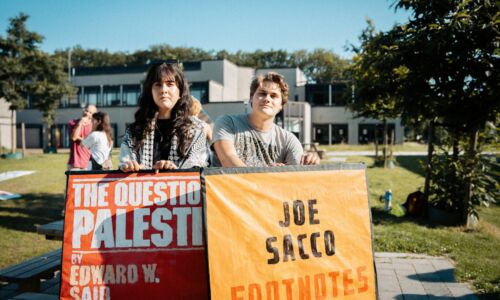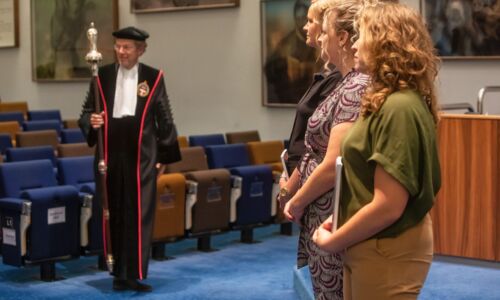‘Confidential advisors at universities don’t have enough power to really intervene’
-
 Photo via Pixabay
Photo via Pixabay
For several years now, the academic world has been trying to counteract ‘scientific harassment’ such as general harassment, sexual jokes, and other undesirable behaviour. Radboud University is also looking for solutions. Within the next few days, the participational bodies and the Executive Board will decide on a new regulation regarding confidential advisors. Will that be enough? ‘There hasn’t been much concrete change yet.’
Liset was having problems with her PhD supervisor throughout her entire PhD track. ‘He was my only supervisor, but he was not much help when it came to the content of my PhD,’ she previously explained to Vox. Conversations she tried to have with him only caused more bad blood between them. ‘“Why don’t you trust my expertise,” he would ask, disgruntled. He also said I should just stop being so insecure.’ She approached the confidential advisor, who was of no help either. To make matters worse, her PhD thesis was rejected.
Other PhD candidates also experienced problems with the same PhD supervisor. ‘But no one had the courage to bring it up,’ says Liset, ‘because they depended on him.’ By secretly consulting with other researchers, she eventually submitted an improved version of her PhD thesis and obtained her PhD.
Harassment
Liset’s story is no exception when it comes to scientific harassment: undesirable behaviour ranging from intimidation to sexual jokes. Lack of social safety is a structural problem at Dutch universities, according to research conducted last year by the trade unions FNV and VAWO. Over a thousand employees were interviewed: 35% of men and 44% of women experience or have experienced an unsafe working environment. A staff survey conducted at Radboud University in 2018 also showed that more than 14% of employees experienced undesirable behaviour in the workplace.
‘Staff members learn how to intervene if, for example, someone makes an inappropriate remark in a meeting’
University umbrella organisations and universities recognise the problem and are looking into taking measures. Radboud University is also looking for solutions. Within the next few days, the participational bodies and the Executive Board will decide on a new regulation regarding confidential advisors at Radboud University. One of the proposals is that from September, a university-wide team of confidential advisors must facilitate the reporting of abuse. The new team will also be subject to annual training and will have to submit reports. But is that enough?
Gender researcher Marijke Naezer, who studied social safety at universities (see box), thinks that more measures are needed to improve the situation in the workplace. She acknowledges the importance of the confidential advisors. ‘They are there to listen, which is important,’ says Naezer. At the same time, she points out their limited authority. ‘They often simply do not have enough power to really intervene. They can’t start an investigation or address a perpetrator.’
Research
Marijke Naezer, Marieke van den Brink, and Yvonne Benschop conducted research into social safety at Dutch universities. The report Harassment in Dutch Academia contains 53 cases of women who were confronted with various forms of misconduct. The 2019 study highlights the various manifestations of misconduct, the underlying causes, and recommends possible solutions. It was commissioned by the Landelijk Netwerk Vrouwelijke Hoogleraren (LNVH – Dutch Network of Women Professors).
Universities are therefore already experimenting with involving an ombudsperson — someone who does have the power to start an investigation and interrogate people. Naezer follows developments closely, although she also fears that the pilot is not ideal. ‘The fact that ombudspersons are employed by universities means they are not independent,’ explains the researcher. ‘It reduces the power they have. The Executive Board may disregard a verdict from the ombudsperson if it does not fit in with its agenda.’ Naezer is therefore arguing for a national independent institute. ‘This would also work with an ombudsperson, but they would be independent.’
Undesirable Behaviour
In addition to working on the complaints regulations, universities organise lectures, workshops, and coaching sessions on social safety. The goal is to make employees aware of undesirable behaviour and to teach them what they can do themselves. Naezer views these as welcome developments. She mentions training for bystanders as an example of how workshops can contribute to a safer working climate. ‘Staff members learn how to intervene if, for example, someone makes an inappropriate remark in a meeting. It offers them certain tools to use,’ says Naezer.
Michiel Kompier, Dean of Social Sciences and Professor of Labour and Organisational Psychology, also underscores the importance of creating awareness among staff members. Kompier: ‘It is important to agree on what is desirable behaviour and what is not. By discussing examples and situations with each other, you create a more open culture. This contributes to a safer working environment.’
In 2019, VSNU, NWO, and others, published the Erkennen en waarderen (recognise and appreciate) report, which was endorsed by all Dutch universities. One of the priorities of the report is to change the work culture. Scientists should work in teams more often, which should contribute to a safer and more inclusive work culture.
Dependency
Naezer explains: ‘There is a lot of individualism, competition, power inequality, and dependence at the moment. PhD candidates or postdocs, for example, are completely dependent on one or two supervisors for their careers. If they do not like you, you’ve got a problem. They sometimes tolerate much more from their supervisor than they would from someone else, and some supervisors take advantage of this.’
Kompier adds: ‘Team science must counteract that dependency. Working in teams reduces the risk of abuse. It makes it a lot harder to deceive or put pressure on somebody.’ The Dean emphasises that changing the work culture takes time. ‘The plan is ready. Now it is up to the faculties. They now have to put the plans into practice.’
Kompier and Naezer agree that universities are far from being able to sit back and relax. Kompier: ‘The first steps towards a socially safer work environment have been taken. But this really is only the start.’ Naezer feels the same way. She welcomes the increased attention of umbrella organisations and universities to the theme of social safety, but at the same time cautions against celebrating too early. ‘There hasn’t been much concrete change yet. So I wonder: are they pretty words or is something really going to happen?’
Within the next few days, Radboud University can take a new step towards a socially safe working environment. The participational bodies and the Executive Board will decide on an updated regulation regarding confidential advisors.



